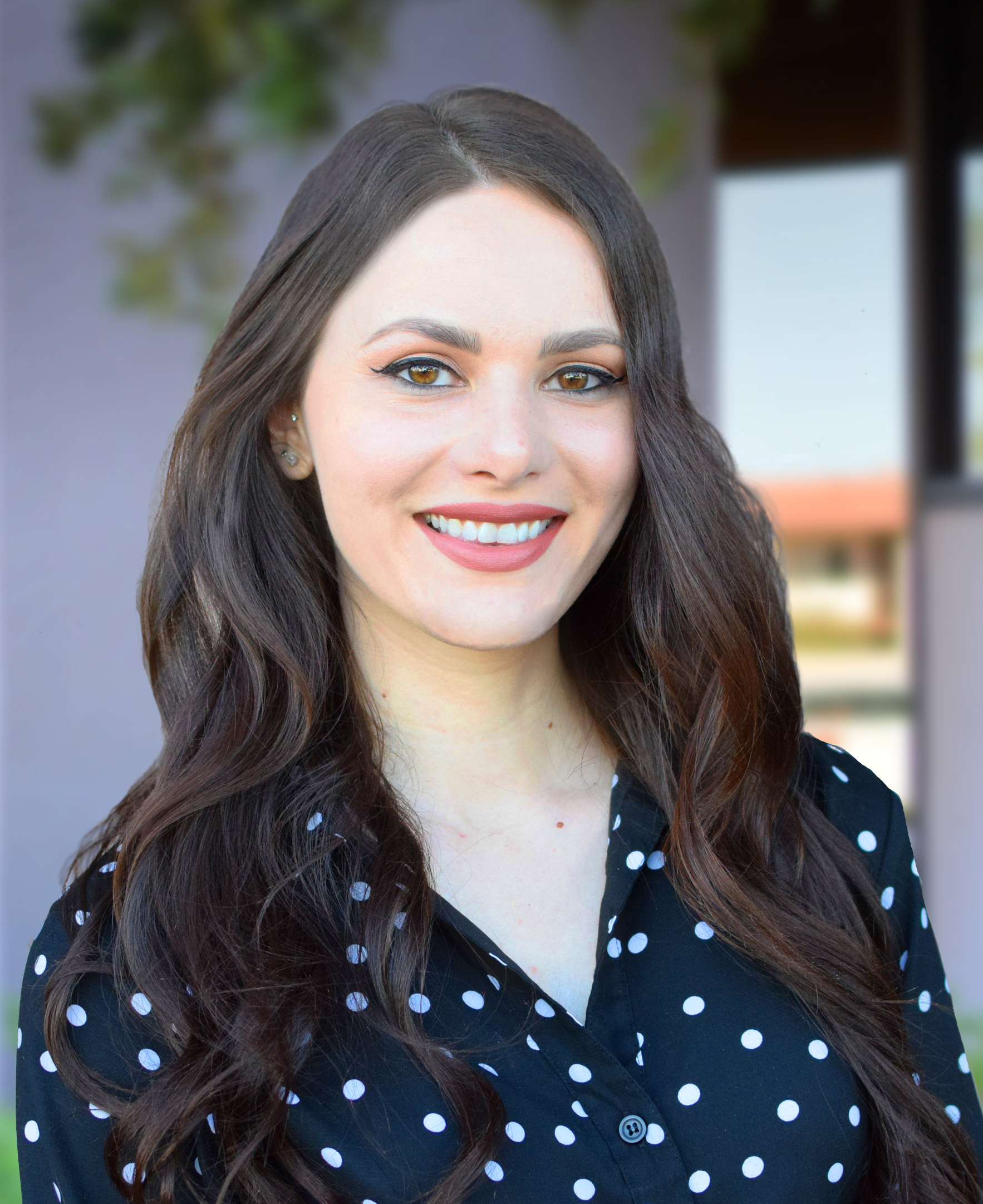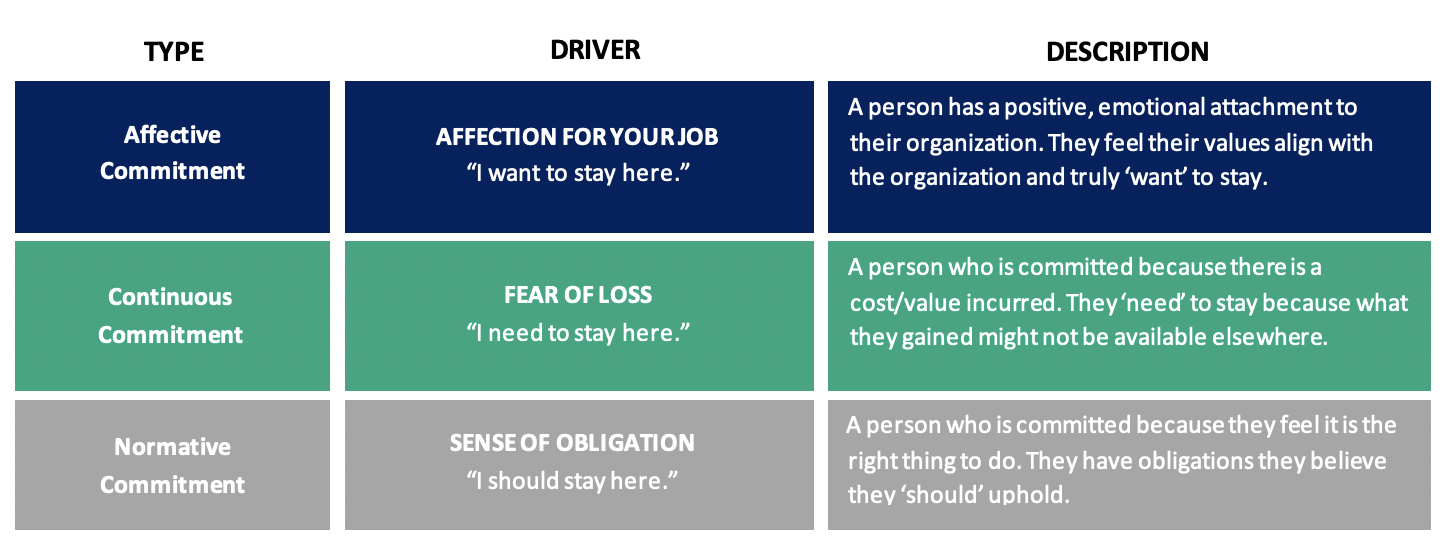
 SHOULD I STAY OR SHOULD I GO: AFFECTIVE COMMITMENT
SHOULD I STAY OR SHOULD I GO: AFFECTIVE COMMITMENT
Trisha Martin, Sr. Learning & Development Consultant
Take a look at following responses to the question, “Why do you still work at ________?”.
- I don’t really have another option. The pay here is better than anywhere else.
- I just should. My friend helped me get the job and I really owe it to my team to stay. I can’t just leave.
- We help people help themselves. That’s empowering and it resonates really deeply with me.
Which response indicates commitment to an organization? What if I said they all do? The third response may seem the most obvious, but the first two are also often the reason employees stay with an organization. Despite our own perception of what defines commitment, these three employees have developed a different type of psychological connection to their job. We call this, organizational commitment.
What Is Organizational Commitment?
Organizational commitment is the “psychological attachment” a person has to an organization. Several models have been developed to further define this concept, but Meyer and Allen’s Three Component Model is the most widely accepted. The model is broken into three components:

If you look back to our three examples, you will notice that each corresponds to a different commitment component. Why does this matter? All three employees are committed, right? Not entirely. Organizations are much more likely to retain those who fall under affective commitment. Continuous and normative employees may be committed for a length of time, but are more likely to leave if the right opportunity presents itself. Additionally, continuous and normative employees have lower job satisfaction, thus producing lower levels of engagement and productivity.
Affective Commitment at Goodwill
an interview with Natalie Rodriguez and Jeremi Williams
I have always been interested in human behavior in the workplace, and am especially curious about organizational commitment. To satisfy some of this curiosity, I sat down with two exceptional team members – Natalie Rodriguez and Jeremi Williams – to get a better understanding of their commitment to Goodwill. Natalie is a Retail District Manager and has been with the organization for almost nine years. Jeremi is a Strategic Partnership manager on our Mission Team and started his career with us 7 years ago.
Affective Ambassadors
Natalie and Jeremi share a foundational Affective Commitment characteristic: genuine attachment. Affective Commitment has the strongest emotional attachment of the three commitments, where employees are seen as ambassadors of the organization. When explaining to those who are interested in working for Goodwill, Jeremi stated, “If you’re looking for an organization with integrity, I promise you will experience that here every day.” Jeremi talked about accountability and how much he respects this aspect of our organization. Similarly, Natalie highlighted how much she appreciates Goodwill for upholding its mission every day, saying, “People want to be somewhere they feel proud of. The fact that we create real impact inside and outside the company is absolutely priceless.”
The Importance of Values
Another critical characteristic of Affective Commitment is attachment to the organizational goals and values. What an organization stands for plays a large role in employee commitment. At Goodwill, our values are part of everything we do. I asked Jeremi and Natalie which value they believe aligns the most with their own set of values. Here is what they had to say:
Jeremi – “Innovation, collaboration, and engagement. I love to communicate with people, engage with them to find out what’s going on, and build that relationship. I truly, truly, love it and I don’t even feel like it’s work. The innovation piece – I need that. I need the ability to come up with new ideas and the fact that our organization values that really resonates with me.”
Natalie – “I am very committed to authenticity and I believe that goes hand and hand with trust. You can’t build connections and move people forward unless they trust you. Growth is uncomfortable for some people and if they don’t trust you, then they won’t be authentic and they won’t get to where they want and need to be.”
Why Goodwill?
To close out our conversation, I asked Natalie and Jeremi why they have stayed with Goodwill for so long. There is no doubt they are talented individuals who would succeed at any organization – so, why Goodwill?
Jeremi spoke passionately about our mission, noting how proud he is to be a part of an organization that responded quickly to this past year’s events. He shared, “Our biggest battle was the pandemic and our organization was quick to react to what the community needed. We were able to come up with something that helped our community in an even better and deeper way – it has been the highlight of my career.” Natalie also talked about our mission and how much we stand out from other organizations. “It’s difficult to find what we have at this organization. We help people help themselves. That’s empowering and it resonates really deeply with me.” Sound familiar?
Organizations benefit from a lot of things, but they are only as great as its people. I am sure I speak for many when I say I am grateful to work alongside some really great people. To quote Natalie again, people want to be somewhere they feel proud of. So, Goodwill, let’s make them proud.


